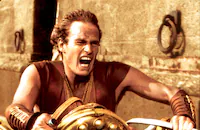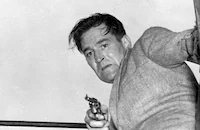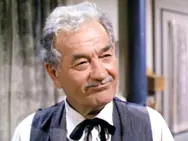The Savage
Brief Synopsis
Cast & Crew
George Marshall
Charlton Heston
Susan Morrow
Peter Hanson
Joan Taylor
Richard Rober
Film Details
Technical Specs

Synopsis
His Virginia home having been devastated during the Civil War, schoolmaster James Aherne accompanies his eleven-year-old son, James, Jr., toward a new life in the West. As the party traverses South Dakota's Black Hills, which they have been informed can be safely crossed if they observe the rules set down by the Sioux nation, they are attacked without warning by a group of Crow Indians. Although everyone else in the party is killed, young Jim is saved by the arrival of Chief Yellow Eagle and his Miniconjou Sioux warriors, who have been trying to rid the territory of Crow raiders. Yellow Eagle names the boy Warbonnet because of his bravery during the attack, and rears him as a Sioux. Warbonnet reaches manhood as tensions between whites, who are after newly discovered gold in the Black Hills, and the Sioux, who expect their sovereignty of the territory to be respected, as stated in the treaty signed years earlier, reach their peak. Running Dog, who has always hated Warbonnet, believes that the chief's adopted son would be unable to fight his own people in the event of war, but at a council of Sioux chiefs, Warbonnet asserts his loyalty to the tribe and his love of Yellow Eagle, his mother Pehangi, and his sister Luta. When Warbonnet nevertheless urges that the decision to go to war be made with caution, his father sends him to Fort Duane to determine whether the U.S. government actually intends to break the treaty. On his way, Warbonnet is instrumental in saving a party of soldiers, led by Lt. Weston Hathersall, from attacking Crow Indians. As a result, Warbonnet is commended for bravery and treated warmly by Fort Duane's Col. Robert Ellis. Wes's sister Tally is attracted to Warbonnet, and both she and her brother are surprised when the newcomer, who dresses and acts like an Indian, recites an Omar Khayyám poem from memory. He is distrusted, however, by Capt. Arnold Vaugant, an Indian-hater who calls him a "savage." As the days pass, Luta wonders why he has not yet returned home, while Long Mane, Warbonnet's closest friend, suspects that he may have found "new friends." Warbonnet leaves the fort immediately upon learning through smoke signals that Luta has been captured by soldiers. He soon encounters Long Mane and Running Dog, who inform him that a party of Crow had killed the soldiers and captured Luta. Warbonnet leads a party of five Sioux to the Crow camp, where he bravely rescues his "little sister." While returning to their village, however, they are attacked by Vaugant's men, and Luta is killed. After denouncing his white heritage, Warbonnet challenges and kills Running Dog for having abandoned him at the Crow camp. Convinced that the whites intend to kill his people, he then agrees to lead the soldiers at Fort Duane into a Miniconjou ambush. Back at the fort, Ellis reads the new orders from Washington, instructing him to move all the Indians to reservations, using force if necessary. Acting as their scout, Warbonnet leads Vaugant's men to the Crow encampment, which they soon destroy with cannon fire. Vaugant then moves into the woods to fight the rest of the Crow, even though Warbonnet warns him that his plan will only get the soldiers killed. Warbonnet and Corp. Martin, acting independently, use explosives to flush the Indians out of the woods, where Wes's men are waiting to subdue them. Furious, Vaugant tries to shoot Warbonnet, but Martin grabs his arm, and Vaugant dies instead. That night, Warbonnet meets secretly with Yellow Eagle and his warriors, and plans to ambush the column are finalized. When Yellow Eagle directs his men to take no prisoners, however, Warbonnet begins to doubt the wisdom of the attack. The next morning, a wagon train carrying women and children joins Wes's column for protection. As they pull out, Martin remarks that whites and Indians should be able to share the land, but that simple arithmetic insures a U.S. victory if the Indians insist on fighting. Realizing that Martin is right, Warbonnet helps the wagon train to escape the planned ambush, but is hit in the shoulder with an arrow. That night, a feverish Warbonnet sneaks away from Fort Duane and attempts to persuade Yellow Eagle that continuing the war will only lead to their deaths, and that many of the whites he has met are good at heart. In observance of Miniconjou law, Yellow Eagle flings a lance into his adopted son and wounds him for betraying him earlier that day. He assures Pehangi that he had no intention of killing her son, but she is deeply distressed and declares that Warbonnet spoke the truth. In the morning, the Miniconjou take Warbonnet back to the gates of Fort Duane, and Yellow Eagle asks him to make a place for his people among the whites. After promising to return to them, Warbonnet greets Tally and Martin and explains that the Miniconjou have decided to give the whites "a little elbow room."

Director

George Marshall
Cast

Charlton Heston
Susan Morrow
Peter Hanson

Joan Taylor
Richard Rober

Donald Porter

Ted De Corsia
Ian Macdonald

Milburn Stone

Angela Clarke
Orley Lindgren
Michael Tolan
Howard J. Negley
Frank Richards
John S. Peters

David Miller
Frank Cordell
James Van Horn
Willard Willingham
Roger Creed
Henry Wills
Ben Black Elk
Kirk Alyn
Jim Hayward

John Miljan
Jimmie Dundee
Marion Gray
Iron Eyes Cody
Ben American Horse
John Sitting Bull
Crew
Sydney Boehm
Robert Brower
Sam Comer
Mel Epstein
William Flannery
Edith Head
Gordon Jennings
Harold Lewis
Curtis Mick
David H. Miller
Ray Moyer
Walter Oberst
Hal Pereira
Oscar Rudolph
Paul Sawtell
Arthur Schmidt
John F. Seitz
Wally Westmore

Film Details
Technical Specs

Quotes
Trivia
Notes
The working title of this film was Warbonnet. According to onscreen credits, the picture was photographed in the Black Hills of South Dakota. Studio publicity material adds that twenty-five separate South Dakota locations were used, including several in Custer State Park. According to a Hollywood Reporter news item, the production was headquartered in Rapid City, SD. In most reviews and news items, actor Michael Tolan is listed as Lawrence Tolan, the name under which he began his screen career. The Savage marked the actor's first screen credit as Michael.
According to MPAA/PCA records, contained at the AMPAS Library, Don Martin wrote a draft of the film's screenplay. Martin's contribution to the final film has not been confirmed, however. According to studio publicity, over 200 Sioux Indians, including Sitting Bull's 91-year-old son John Sitting Bull, were cast in the picture. Hollywood Reporter news items add the following actors to the cast: Joe Lopez, Paul Salata, Burton Topper, Ken Swanson, Billy Wilson, Michael Tellegen, Al Conde, Rudy Masson, Joseph Garcia, Leo Richmond, Charles Rivero, George Sawaya, Charles Soldani, Ralph Barba, Jean Mullen, Edith Mills, Shela Fritz, Mary Turbay, Bertha Cody, Andrea Bird, Soledad Gonzales, Lemmana Guerin, Vi Ingraham, Beulah Archuletta, Joe Sadd, John Eberts, Renato Siauss, Tom Tamarez, Baudelio Alva, Jeri Groves, Panchita Acosta, Carlos Acosta, Helen Sky Eagle, Stevie White Flower and Princess Whynemah. The appearance of these actors in the final film has not been confirmed. According to Hollywood Reporter, Conde, who was announced in the role of an "Indian," was the basketball coach at the University of Southern California at the time of production.
The Variety reviewer remarked that "the core of the [racial] matter, while suggested throughout, has been bypassed for a standard round-up of reactionaries and liberals, both red and white....But in a few cryptic scenes between the hero and a grizzled, plain-talking sergeant...this Hollywood semi-sermon has its best moments and hits the nail squarely on the head." The Savage was the last released film to star Richard Rober, who died in 1952.












